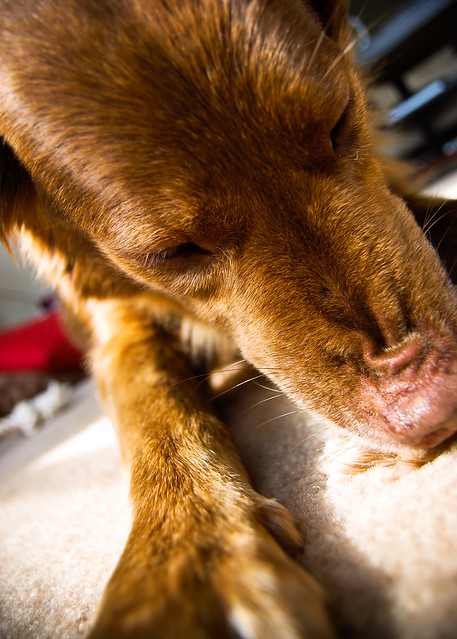 |
Photo by RLHyde  |
Many allergies that dogs suffer from are caused by insects such as fleas and ticks, or by parasites. When you bring your dog home from a breeder or from a shelter or pet store, schedule an appointment with a vet as soon as possible. Make sure the dog has all of its shots and that is has been dewormed. This will prevent parasites from causing an allergic reaction in your dog. While you may have to do this more than once during their lifetime, getting rid of the parasites will help your dog’s temperament and keep them healthy.
If you noticed small red bites on your dog or if the dog has been scratching the same area until bald spots appear, then they may have fleas, ticks, or mites. This allergic reaction is caused by insect saliva. If your dog has open wounds, you should wait until the wounds heal before spraying or bathing them with medicine that kills the insects and their eggs. Take your dog to the vet if this is the first occurrence. The vet may be able to prescribe an ingestible pill that will protect them from future infestation. You may also want to keep your dog indoors during flea and tick season.
When your dog vomits more than once a week or has diarrhea for more than one or two days, they may have an allergy to dog food. Switching to another brand or feeding the dog softer food may solve this problem. You should take the dog to the vet anyway so that they can make sure the dog is healthy. Extreme diarrhea will lead to dehydration, so make sure you have plenty of water for your dog to drink.
If your dog’s mood changes suddenly or you notice that they are not as playful as they once were, then you should take the dog to the vet. If the dog has eaten something it shouldn’t or if it is suffering from allergies, it will not want to play as much as it used to. Finding out the cause of their allergy may be difficult because, much like human beings, your dog may be allergic to more than one thing.
Research your dog’s breed to see if there are specific items it could be allergic to and see if they are present in your home. Monitor your dog to see how it behaves and what it is eating. Sometimes eating too much grass can cause an allergy attack. Once you find the causes of the allergy, take the steps necessary to reduce the dog’s exposure what is causing the allergy as much as possible.

No comments:
Post a Comment